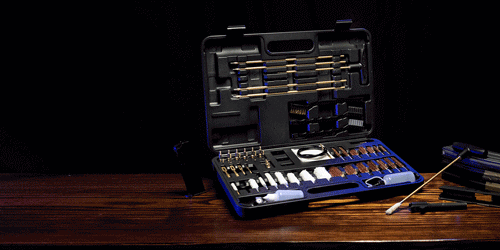Safety Tips for Hunters
Hunting is often considered one of the safest outdoor activities, boasting a lower injury rate compared to many other sports. Nevertheless, prioritizing safety is crucial to ensure a successful and enjoyable hunting experience. Here are some key safety tips for hunters to consider before you head into the field.

Know Your Firearm and Equipment
Before you head out, make sure you are thoroughly familiar with the firearm or bow you’ll be using. Read the user manual, understand its mechanics, and practice handling it. Never use equipment you haven't mastered in a safe environment.
- Always Treat Firearms as Loaded: Handle every firearm as if it's loaded, regardless of its state. This mindset keeps you in the habit of pointing your gun in a safe direction.
- Regular Maintenance: Keep your firearm in excellent working condition by cleaning and maintaining it regularly. Take your firearm maintenance to the next level with the Gloryfire Gun Cleaning Kit Elite, the perfect solution for keeping your gun clean, reliable, and accurate

Wear protective gear
Hunters' eyes and ears are vulnerable to a number of potential hazards while hunting, so it's important to protect them. Firearms create a high-decibel sound that can damage hearing. The firearm also discharges small particles of the projectile, burning gas and other residue that can damage your eyes. Always wear safety glasses and ear protection. Take your hunting experience to the next level with the Gloryfire Bluetooth Ear Protection, combining industry-leading noise reduction with seamless Bluetooth connectivity for a safer and more enjoyable experience.

Understand and Follow Hunting Regulations
Every state and region has specific hunting regulations. These laws are designed to protect wildlife populations and hunters alike. Always check the local hunting laws for:
- Permitted Hunting Seasons: Know when and where you can legally hunt your targeted species.
- Licensing and Permits: Ensure you have the correct license and tags for the animals you are hunting.
- Bag Limits: Be aware of daily and seasonal limits to avoid penalties and contribute to sustainable hunting practices.
Hunting Safety Courses
Taking a hunter safety course is not just recommended—it's mandatory in many states. These courses teach essential skills like firearm safety, wildlife identification, survival skills, and hunting ethics. Completing a safety course will boost your confidence and knowledge, helping to make the experience safer for everyone.

Stay Aware of Your Surroundings
Accidents often occur when hunters fail to pay attention to their environment. To avoid injuries:
Identify Your Target and Beyond: Before pulling the trigger, always be certain of your target and what's behind it. Never shoot at movement or sound without positively identifying the source.
Use Tree Stands Safely: If you're hunting from a tree stand, make sure it's sturdy and properly secured. Always wear a safety harness to prevent falls. Tree stand falls are the leading cause of hunter injuries, highlighting the need for extra caution when using elevated hunting platforms.
Communicate Your Location: Let someone know where you’re going and when you expect to return. Carry a map, compass, or GPS device to avoid getting lost in the woods.
Practice Weapon Safety
When handling firearms or bows, safety should always be your top priority. Here are some basic principles:
Keep Your Finger Off the Trigger: Keep your finger outside the trigger guard until you're ready to shoot.
Point the Muzzle in a Safe Direction: Always point the muzzle of your firearm in a direction where an accidental discharge would not cause injury.
Unload Firearms When Not in Use: Ensure your gun is unloaded when not in use or when climbing obstacles like fences, trees, or steep terrain.

Prepare for Emergencies
Being prepared for emergencies can make all the difference if things go wrong in the wilderness. Always carry:
A First-Aid Kit: Include essential items such as bandages, antiseptics, and pain relievers. You can also include materials specific to common hunting injuries.
Survival Gear: Bring essentials like fire-starting tools, a multi-tool, a whistle, extra food, and water.
A Cell Phone or Two-Way Radio: Even if you have limited service, it’s a good idea to have a means of communication in case of emergency.
Practice Safe Firearm Storage
When transporting or storing firearms, safety precautions are critical. Use a secure gun case or sleeve when traveling and store firearms unloaded at home. A gun safe is highly recommended for safe storage, reducing the risk of accidents and theft. Learn more about the importance of using a gun safe: Why Gun Owners Need a Gun Safe





